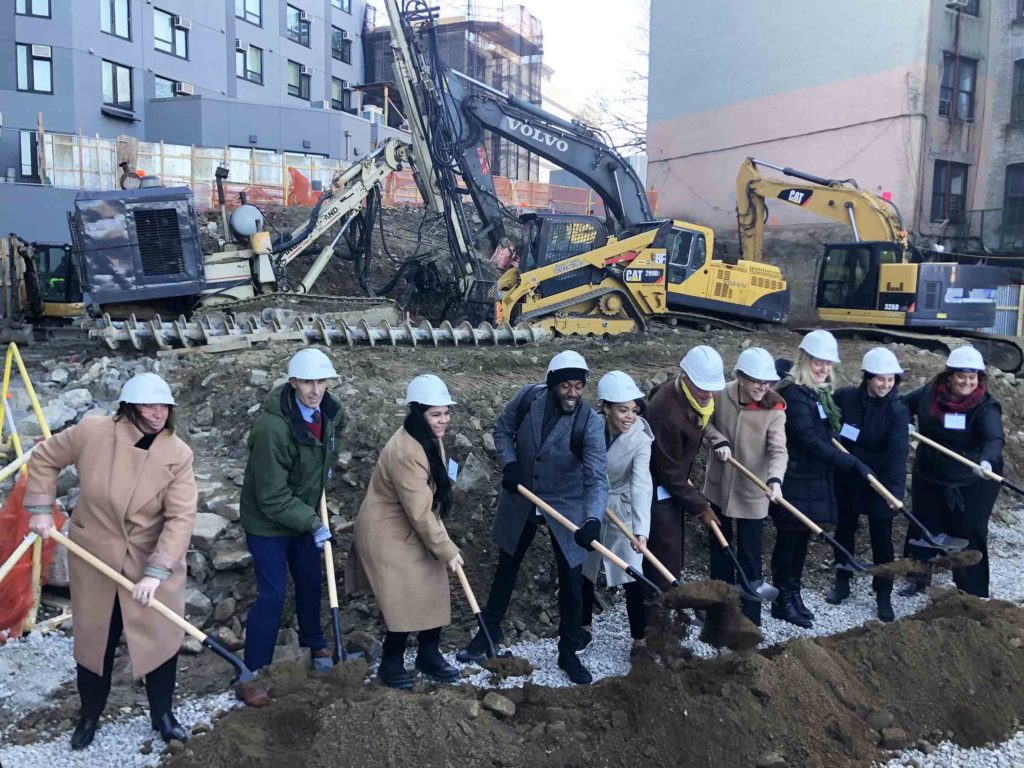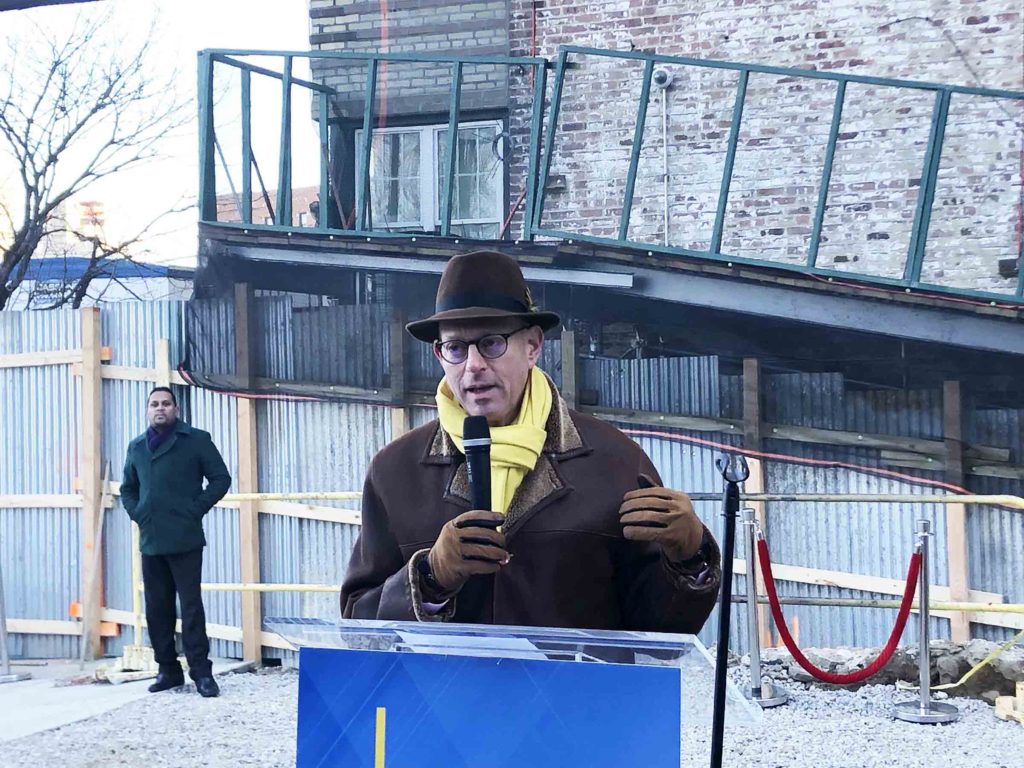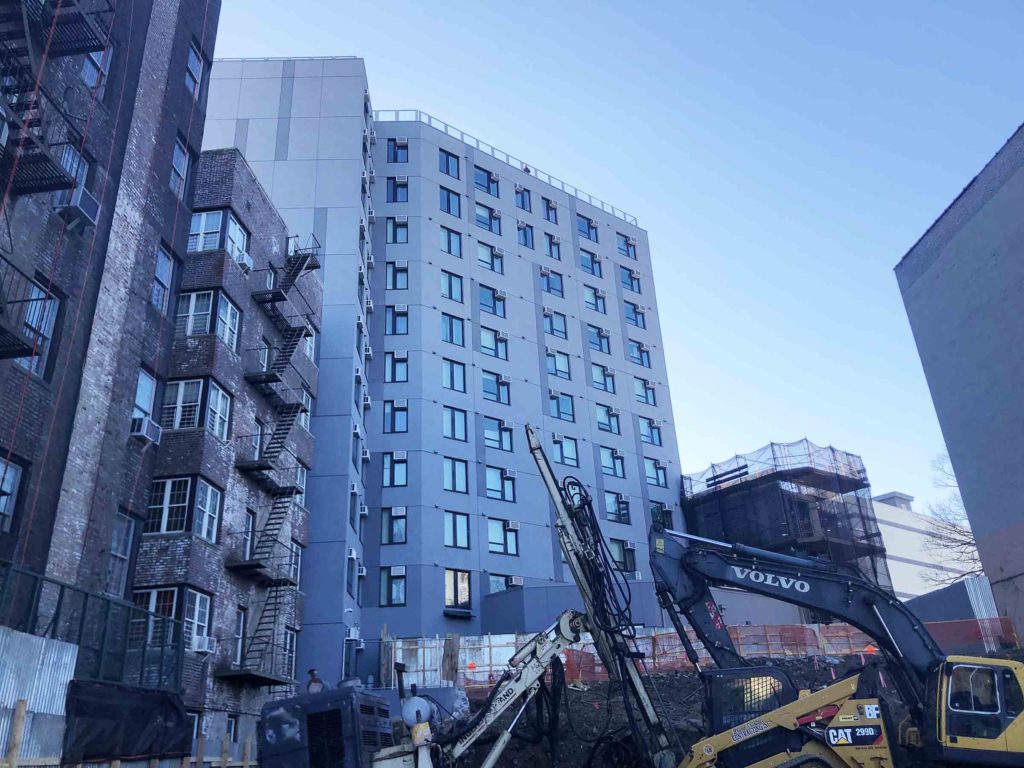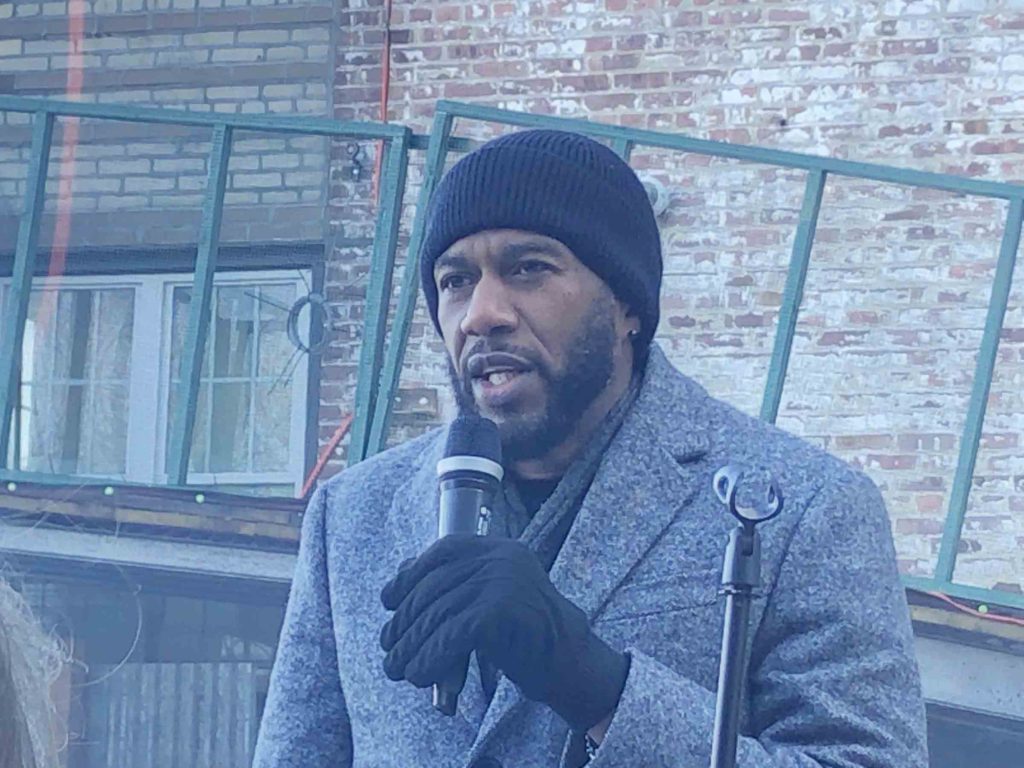
Photo by Julian Roberts-Grmela
Construction of Bedford Green House II, located at 2880 Jerome Avenue in Bedford Park, the second of a two-phase, supportive housing development, began on Friday, Dec. 9. The first building, constructed under Phase I of the development and located on the adjacent lot at 2865 Creston Avenue, was completed last winter and residents started moving in in January 2022. A formal ribbon-cutting opening ceremony took place in July.
As reported, Mayor Eric Adams, Bronx Borough President Vanessa Gibson, State. Sen. Gustavo Rivera (S.D. 33), Adolfo Carrión Jr., NYC Department of Housing, Preservation & Development (HPD) commissioner, Eric Rosenbaum, CEO and president of Project Renewal, and Bedford Green House resident, Alexis Reid, joined other government officials at a ribbon-cutting ceremony for the opening of Phase I of the supportive housing complex, located at 2865 Creston Avenue in Bedford Park on Thursday, July 14, 2022.
News of the construction comes on the back of the mayor’s recent announcement of the City’s latest approach to addressing the homelessness crisis, as well as a related mental health component to the crisis, amid mixed reaction. The City’s latest approach requires substantial input by the NYPD, as the first point of contact with homeless people who may have mental health issues, which critics say is not the best approach. Nearly 1,500 people are recorded as being homeless every month in The Bronx, according to City data.
Meanwhile, Phase II of the 17-story, Bedford Green housing development is expected to be completed in 2025, according to a presentation to Bronx Community Board 7 (CB7)’s housing and land use committee on Sept. 12 by Project Renewal, the entity developing and operating the housing project.
According to the presentation, Phase II of the development, which is costing $72 million, will comprise 116 new apartments, 70 of which will be supportive units for the formerly homeless. Of these 70 apartments, 38 will be allocated to people with a mental illness, including 14 for seniors, while 32 will be allocated to those with a substance use disorder.
Meanwhile, 46 units will be made available as affordable housing units to the community. Additionally, it will include a 2,400 sq. ft., street-facing, medical clinic, a library, social service office, fitness center and landscaped backyard.
Of the latest phase of the project, Gov. Kathy Hochul commented, “As our state faces a severe housing shortage, essential projects like this Bedford Green development are critical to ensuring that all New Yorkers have a safe, stable, and affordable place to call home.”

Photo by Julian Roberts-Grmela
The primary care medical clinic at the housing complex will serve both residents and the wider community. As previously reported, some Bronxites are skeptical when it comes to the running of shelters and supportive housing facilities in The Bronx, the cheapest borough in terms of real estate costs in the City, by non-Bronx-based nonprofit organizations, particularly when they expand their remit beyond onsite services to include the provision of healthcare to local community members.
Article 28 of New York State public health law recognizes and regulates the accreditation of public health care facilities. Article 28-certified facilities participate in Medicare, Medicaid, and private health insurance plans with a higher rate of reimbursement than that of non-certified facilities, and therefore it can be lucrative for such nonprofits to expand healthcare provision beyond their original remit, to avail of such higher rebates.
Project Renewal is a Federal Qualified Health Center (FQHC) and an New York State Department of Health licensed facility, as defined by Article 28 of NYS public health law. According to its website, Project Renewal meets all 20 of the Better Business Bureau’s standards for charity accountability.
“We collaborate with a variety of partners to reach the right mix of funding and achieve our results,” an extract from its website reads. “These include corporations, foundations, public funders at the federal, state, and city level, as well as private individuals. Additionally, our social enterprises and rental income from some of our housing programs provide supplemental revenue.”
A number of scandals involving Bronx nonprofits have not helped to quell this skepticism by some Bronxites. Recently, two shelter residents complained about alleged, inadequate supportive service provision at a shelter at 246 Echo Place in the Mt. Hope section of The Bronx, at which a young mother allegedly stabbed her two, young, infant children to death on Nov. 27. ACS is investigating the incident. Norwood News contacted the shelter for comment. We did not receive an immediate response.
According to NYC Human Resources Administration, supportive housing is affordable housing with supportive social services for individuals and families who are homeless or at risk of homelessness.

Photo by Julian Roberts-Grmela
The onsite supportive services at Bedford Green II will include “coordination of medical services, occupational therapy, crisis management, and assistance with access to public benefits,” according to the Office of Mayor Eric Adams. Eighty of the 116 apartments will be studios, 24 will be one-bedroom units, and 12 will be two-bedroom units, according to the mayor’s office.
Adams said the new development is part of his administration’s effort to build 15,000 new units of supportive housing by 2030. “The combination of supportive homes and a medical clinic here will deliver residents and the entire community access to care they may not otherwise be able to access,” he said.
The 13-story, Creston Avenue building, constructed in conjunction with NYC Department of Housing Preservation & Development (HPD), under Phase I of the development, includes 118 affordable apartments: 71 for formerly homeless residents, 25 for single people living with HIV/AIDS, 30 for families who are dealing with mental illness, and 16 for single people who have a substance use disorder. The development also includes a playground, a rooftop greenhouse, and a social services office.
City officials said all of Bedford Green House II’s apartments will be “affordable to households with incomes at or below 60 percent of the area median income (AMI).” In relation to the 70 units of permanent housing for residents experiencing homelessness, residents will receive rental subsidies funded by the New York State Office of Mental Health.
In its presentation to CB7, Project Renewal officials wrote that care and support is provided for the “full range of physical and behavioral health needs of low-income and formerly homeless individuals and families.” They said all tenants are assigned to a case manager, who is supervised by a master’s level professional.
Case managers meet with tenants to develop support plans. Residents also receive primary medical and dental care, which is currently being provided from a mobile clinic located outside the building. Residents also receive mental health services, substance use counseling, and financial management education, according to the Project Renewal presentation.
In a press release, Eric Rosenbaum, president and CEO of Project Renewal, said of the new facility, “Bedford Green House has become a community of renewal and stability for individuals and families overcoming homelessness, mental health concerns, and other challenges.”
He added, “With this second phase of the development, we are excited to bring not only more critically needed affordable homes to the Bronx, but also a medical clinic providing health care to our tenants and our neighbors in the community.”

Photo by Julian Roberts-Grmela
Meanwhile, Public Advocate Jumaane Williams said supportive housing developments like the Bedford Green House provide the ongoing care and permanent housing that people without secure housing need. Williams said the best way to solve the homelessness issue was to invest in more permanent, supportive housing opportunities.
“This type of project is the type of thing we need to get the continuum of care and actually fix the problem,” Williams said. “It’s hard to do your homework and be well in school if you don’t have a place to live. It’s hard to get better if you’re physically ill, if you don’t have a place to live.”
He continued, “It’s hard to get better if you have substance abuse or mental health issues if you don’t have a place to live. It’s hard to be a productive citizen coming home, a productive resident coming home, if you don’t have a sustainable place to live and a community to help build you, and the supports that are needed.”
*Síle Moloney contributed to this story.




